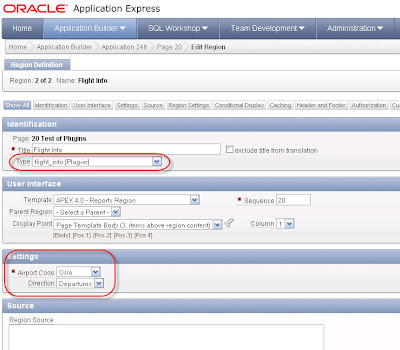Here is my own first attempt at a (useful) plugin: A region plugin that displays up-to-date flight information for airports in Norway, based on public flight data provided by Avinor, the company that operates the Norwegian airport network.
Avinor has a simple web service that provides flight information in XML format.
I am sure there are similar (web) services for flight information in other countries (feel free to leave a comment below if you know of any).
Here is the PL/SQL code behind the plugin:
procedure render_my_plugin (
p_region in apex_plugin.t_region,
p_plugin in apex_plugin.t_plugin,
p_is_printer_friendly in boolean )
as
l_clob clob;
l_airport_code varchar2(20) := p_region.attribute_01;
l_direction varchar2(20) := p_region.attribute_02;
begin
l_clob := apex_web_service.make_rest_request(
p_url => 'http://flydata.avinor.no/XmlFeed.asp',
p_http_method => 'GET',
p_parm_name => apex_util.string_to_table('airport:direction'),
p_parm_value => apex_util.string_to_table(l_airport_code || ':' || l_direction )
);
if l_direction = 'D' then
htp.p('<p><b>Departures from ' || l_airport_code || '</b></p>');
else
htp.p('<p><b>Arrivals to ' || l_airport_code || '</b></p>');
end if;
htp.p('<table width="100%">');
htp.p('<tr><td>AIRLINE</td><td>FLIGHT</td><td>AIRPORT</td><td>TIME</td><td>GATE</td></tr>');
for l_rec in (
SELECT *
FROM XMLTABLE ('//airport/flights/flight'
PASSING XMLTYPE(l_clob)
COLUMNS unique_id varchar2(100) path '@uniqueID',
airline varchar2(10) path 'airline',
flight_id varchar2(20) path 'flight_id',
airport varchar2(20) path 'airport',
schedule_time varchar2(100) path 'schedule_time',
gate varchar2(100) path 'gate')
ORDER BY airline, flight_id) loop
htp.p('<tr><td>' || l_rec.airline || '</td><td>' || l_rec.flight_id || '</td><td>' || l_rec.airport || '</td><td>' || l_rec.schedule_time || '</td><td>' || l_rec.gate || '</td></tr>');
end loop;
htp.p('</table>');
htp.p('<a href="http://www.avinor.no">Flight data from Avinor.</a> Last updated: ' || to_char(sysdate, 'dd.mm.yyyy hh24:mi:ss'));
end render_my_plugin;
The code illustrates several concepts:
- How to render a region plugin using the PL/SQL Web Toolkit (HTP.P) calls
- How to retrieve values from the attributes defined for the plugin
- Using the new APEX_WEB_SERVICE.MAKE_REST_REQUEST function to retrieve a web page as a CLOB
- Using the XMLTABLE function to transform XML into a recordset that can be used in a SELECT
An export of my plugin can be downloaded here, and installed into your own Apex 4 application.
After the plugin has been installed, using the plugin is as simple as adding a Region (of type Plugin) to the page, and configuring the values for Airport and Direction (the plugin attributes) in the region definition.

You can see a live demo of the plugin here (public page, does not require authentication):
http://tryapexnow.com/apex/f?p=test4ea:plugin_demo:0
Note that for this page, I've also taken advantage of the built-in region caching feature of Apex. The region cache duration is set to 10 minutes, which prevents us from hitting the remote web service for every page view. I really like that you can switch on region caching in Apex without writing a single line of code.
Conclusion: Apex 4 plugins rock!
4 comments:
Nice demo Morten!, thank you for sharing your work
jon.
Hi Morten,
I think this plug-in will make a perfect example for a "Process" type plug-in which will be possible with EA2.
The plug-in could do the web service call and write the result of the different columns into an APEX collection. (The collection name should be an attribute of the plug-in) That will give the user a great flexibility how he wants to display the data and he can again use all the components APEX provides.
What do you think?
Patrick
@Patrick: The concept of a "process" type plugin sounds good. I assume that the normal "Conditions" section would apply to the process, so that the developer (ie. plugin user) can use this to control when the plugin/process fires... ?
Yes, these process type plug-ins do have conditions, authorization and build config support as well.
You can already try it out on tryapexnow.com. We just have refreshed it to EA2.
Regards
Patrick
Post a Comment